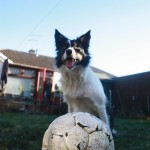CDK Workshop 2009 kick-off talk
 I’m collecting some thoughts for my CDK workshop kick-off talk on Monday and I guess I’ll go for the boring regular version, with an introduction to CDK history, followed by some statistical figures and ending with an explanation of the format for the developers workshop on Tuesday afternoon.
I’m collecting some thoughts for my CDK workshop kick-off talk on Monday and I guess I’ll go for the boring regular version, with an introduction to CDK history, followed by some statistical figures and ending with an explanation of the format for the developers workshop on Tuesday afternoon.
As anyone can read on our CDK homepage, the CDK was started because my old compchem java classes that I had written for the first version of my structure elucidator SENECA and which where also the basis for the first JChemPaint releases needed a re-write (they where actually not bad and pretty fast, but not really object-oriented). By that time, friend Egon had come on board and so we took advantage of a joint visit to Jmol creator Dan Gezelter at Universtiy of Notre Dame to start the redesign. Unfortunately, we lost the two screenshots from Dan Gezelter’s whiteboard at nd.edu where we sketched the object hierarchy which is still largely in place today.
So, here is the current status of CDK in numbers:
- In September 2009, CDK will turn 9 years old and we already start planning for the 10th anniversary workshop.
- Its code base is more than 90,000 lines of code in more than 900 classes and over 9000 methods.
- As of today, 20/04/2009, CDK on Sourceforge has 67 registered developers and
- 86 (111) people are subscribed to the cdk-devel (cdk-users) mailing lists.
- According to Ohloh, CDK is now worth $ 4.6M and took an effort of 84 person years to create.
- The CDK article published in 2003 has been cited 68 times according to Google Scholar (I could not get my VPN to work so I do not know what WebOfScience says about our current citation count)
- According to SourceForge, CDK has been downloaded 90,000 times since 2001.
On the first workshop day, we’ll have tutorials on
- How to get started with CDK, given by Egon Willighagen
- CDK and databases, by Mark Rijnbeek
- CDK and Bioclipse, by Ola Spjuth
- CDK Workflows in KNIME, by Thorsten Meinl and Bernd Wiswedel
followed by the workshop dinner and a second day with scientific talks John van Drie, Asad Rahman and Oliver Karch.
The final discussion will include a presentation by Mark Forster, Syngenta, on his observations on the usability issues of CDK in industry. We also owe Mark a lot for creating the freely distributable linux image with the CDK and all the CDK related software used at the workshop.
On Tuesday afternoon we’ll have a developers workshop, which, traditionally, has the format of an unconference. The ideas for this format are taken from a concept called “Open Space Technology“, which we only discovered after having practised them for more than 5 years :-). To be fair, OST conceptualizes things nicely and relieves one from figuring out how to run meetings as openly as possible. Citing from the Wikipedia articles linked above, the idea is to have a facilitated, participant-driven conference centered around a theme or purpose, in a self-organising process; participants construct the agenda and schedule during the meeting itself.
A facilitator (me in this case) introduces the principles of OST to the participants. Participants then write the title of a session they would be interested in on a piece of paper, walk to the front of the auditorium and announce the title. If a participant proposes a topic, he or she should be passionate enough about the topic to lead the respective session.
OST philosophy is based on four rules and a law:
- Whoever comes is the right people: this alerts the participants that attendees of a session class as “right” simply because they care to attend
- Whatever happens is the only thing that could have: this tells the attendees to pay attention to events of the moment, instead of worrying about what could possibly happen
- Whenever it starts is the right time: clarifies the lack of any given schedule or structure and emphasises creativity and innovation
- When it’s over, it’s over: encourages the participants not to waste time, but to move on to something else when the fruitful discussion ends
There also exists another tentative “law”, usually referred to as the “Law of Two Feet“ (or “The Law of Mobility”), which reads as follows: If at any time during our time together you find yourself in any situation where you are neither learning nor contributing, use your two feet. Go to some other place where you may learn and contribute.
Having said all this, I hope that this largest CDK workshop ever will be asuccess and most importantly fun for everyone. We’ll keep you informed at the CDK 2009 Workshop wiki page.
Categorised as: Blue Obelisk, Chemistry Development Kit, Chemoinformatics, Conferences and Meetings, Databases, Fun, Life of Chris, Open Science, Open Source, People, Scientific Culture, Teaching
Chris, any plans to videorecord any of the prepared talks or others?
Yes, but I developed this plan on Sunday, when it was too late to buy a camera 🙂
But seriously, we really need to set this up for the CDK 10th anniversary workshop next year.